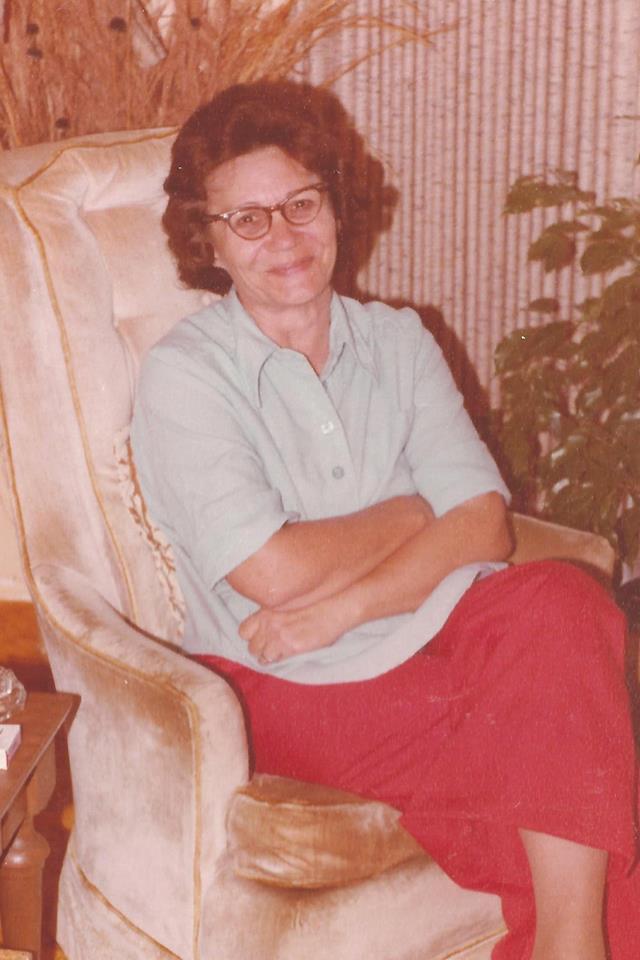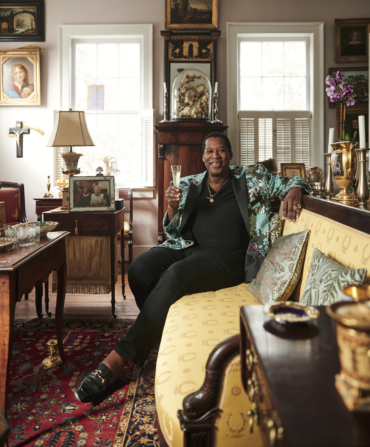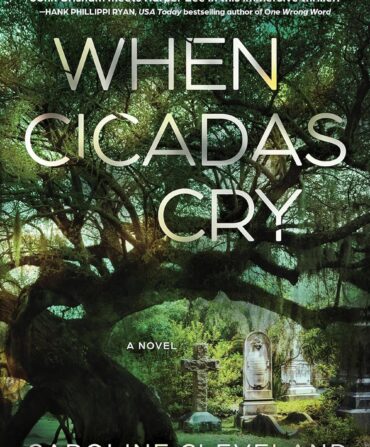We buried my mom late in the afternoon, next to where we put my dad twenty-eight years ago. It was warm enough that the gnats were out in south Georgia. We had driven down to the cemetery in Brunswick from the funeral in Jesup, about forty-five miles, and the whole way, oncoming traffic pulled over in respect. By the time we got out of the car they had already set out the casket. Under the closed lid my mom was wearing a lavender pantsuit. It was the first time she’d ever worn it. It had always been too small for her. But then she got sick, and then she died, and now it fit.
At the graveside a few folks got up and said nice things, and the man from the funeral home read the 23rd Psalm, and we stood around and talked for a little while. We didn’t wait to see them lower her into the ground. I didn’t want that memory. I have so many good memories about my mama, Virginia Tomlinson, and I want to keep those at the front of the line.
Let me tell you one or two.
I’m a little kid, maybe six or seven, and the family has gathered over at our house on St. Simons Island. We’re singing hymns around a tape recorder. Lord, I wish I still had those tapes. My brother, Ronald, is the best singer in the family, so my mom sang harmony—I don’t know if she was any good, but she sounded good to me back then. The song I remember most was Hank Williams’s “I Saw the Light.” Forty years later I went to a Jason Isbell concert and the opening act was Holly Williams, Hank’s granddaughter. She sang “I Saw the Light” and it just about broke me. All of a sudden I was a little boy again, sitting at the kitchen table, enraptured by my mama’s voice.
I’m older, maybe thirteen or fourteen, and I am growing my hair out in a desperate attempt to be cool. I’m a fat kid with acne and crooked teeth, but I have thick hair, and I think maybe it will grow long and straight like a rock star’s, and then I will have a chance with girls. Instead it gets to my ears and flares out sideways, and on top it puffs up like an old lady’s beehive. I get dandruff that covers my shoulders like sea salt. I’m a mess. I’m whining about it one night, because teenagers whine, when my mom says, “Let me wash it, then.” So we clear off the kitchen counter and I lie on my back where the dish drainer normally goes and I hang my head over the sink, and my mom washes my hair for what seems like an hour. The dandruff doesn’t go away. No girls magically appear. But somehow I feel better, because my mama did what she could.
I am twenty-nine, and I have throat cancer. I have to have surgery, and I don’t know if I’m going to come out of it with a voice. I spend sixteen nights in the hospital in Charlotte. My mom, who’s sixty by this point, spends those nights in a chair next to my bed. She leaves only to eat, to use the bathroom, and to smoke. I end up with a weak, raspy voice, but—thank God and modern medicine—a voice. They wheel me out the front door on leaving day, but we can’t leave right away. All the people from the smoking area around the corner come around to hug Mama’s neck and meet her boy. She had collected a dozen friends.
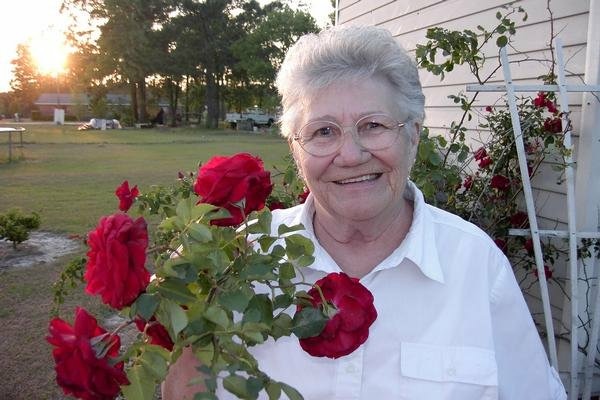
Photo: ALISON WILLIAMS
The writer’s mother.
I am fifty-four, leaning toward her in her hospital bed. This is January, a week or two before she died, and she can’t hear what I’m saying. I’ve got that soft voice, and she’s eighty-five and left her one working hearing aid back at the nursing home. I keep trying to talk to her and she keeps cocking her head, not understanding, and finally I break down in anger and frustration and grief. She is dying. We all know it. But she reaches out and comforts me. She says how she wishes she had been able to do more for her children, had been able to take us more places, but there was never enough money, and she always had to work.
I don’t want to argue with her, and she can’t hear me anyway. But in my mind I say: No. You don’t understand. You did everything. You’re doing it right now.
***
The way she always told the story, she was twelve when she had to take over the household. Her sister, my Aunt Mae, remembers it being even before that. Either way, when they were little girls, their mother took ill—she was paralyzed on one side for the rest of her life. My mom was one of seven children, but the older girls were already married and out of the house. Their dad wasn’t around much, and when he was, he drank or ran off with what little money they had. They were Yarbroughs and they were sharecroppers, picking cotton on another man’s land. They moved from shack to shack, one step ahead of the rent. It fell to my mom to hold the broken family together.
She woke up before dawn and made three pans of biscuits for breakfast, then put on a big pot of beans or peas to simmer on the wood stove for lunch and supper. Then she went out in the fields to pick cotton with the rest of the family from daylight to dark. At the end of the day she cleaned up and washed clothes. Then she did it again, year after year after year.
She got married as a teenager, had two children, made it out of the fields. That marriage didn’t last. She started working at a seafood packing plant that sent a bus to Jesup every day to take workers down to St. Simons. At SeaPak, she met my dad. They got married in 1963 and bought a little house for $50 a month and had me. My mom worked the line at the seafood plant. When she came home every day, the first thing she did was strip off her white polyester uniform. It smelled like shrimp.
She had quit school after one day of fourth grade. But growing up she spent every free moment reading hand-me-down comic books. She remembered reading Superman, and I can only imagine how much of a blessing it was to be lifted out of a shotgun house with pasteboard over the walls and be transported to Metropolis. She never stopped reading. Until the last few months of her life she read romance novels by the bushel. The library in Jesup has a few racks of paperbacks that you can swap out—you don’t even need a library card—and she would drop off the ones she had read and fill up two tote bags with new ones.
And you wonder why I work with words for a living.
She got injured on the job at SeaPak—a rack of frozen food fell on her and messed up the nerves in her neck and shoulder. But after a few years, when my dad got sick and couldn’t work anymore, she found a job as a waitress at a hotel restaurant that became a Denny’s. It was at one of the I-95 exits in Brunswick, so they got lots of travelers. One couple from up north got to know Mama and started stopping by every time they went to Florida and back. If she wasn’t there, they’d call her at the house and she’d come down to have a cup of coffee with them. She kept in touch with them for years, long after she retired and they stopped traveling.
When she was working there, she’d come home exhausted and hand me her apron. Her tips would be stuffed in the pockets. I’d roll the change and count out the bills and she might let me skim a few bucks off the top. When I went off to college, and called home asking for money, sometimes I’d get an envelope with a stack of $1 bills. I thought of those hard-earned dollars a lot in her later years, when I saw her bent-back thumbs, and the shoulder that never quit hurting no matter how much we rubbed it.
She would rest a little bit, then get up and take care of the house or go outside and hoe the weeds in our big garden. Then she would make supper. My dad and I pitched in but she toted most of the load. I have never known anyone else who worked harder, for longer, than my mom. Part of the reason she worked like that is so I wouldn’t have to. As she got older, and one of us kids would send her money or buy her something, she always said we didn’t need to do it. We never could convince her that we were trying to pay her back, and no matter what we did, we would never square the debt.
***
Mama started smoking when she was a teenager, maybe before, because just about everybody back then smoked and nobody knew any better. It was her one and only addiction. She paid no attention when the rest of us begged her to stop. She wrote letters to the editor of the Jesup paper telling people to leave smokers alone. She smoked maybe sixty years, until she went into the hospital for bleeding ulcers, stayed a week, and had lost the craving when she came out. She didn’t trust it—she kept her last carton of Raleighs around the house for a month. When she still didn’t want one, she went to the store and got her money back.
But of course smoking got her, just like it got my dad. She developed COPD—chronic obstructive pulmonary disease. She had to wear an oxygen tube hooked to a big tank in the living room, or a portable tank when she left the house. Even with the oxygen, if she walked down the hall to the bathroom, when she got back she was bone tired. Her lungs gave out a little more each day, a slow and relentless chokehold. By the end she had all kinds of other problems—kidney failure, a urinary tract infection that kept coming back—but smoking killed her. If I got to choose how people spent the afterlife, I’d put every tobacco executive in a hard hospital chair and make them watch smokers die, one by one, for eternity.
My mom would be mad at me saying that. She taught me to be kind.
She did have strong opinions. If bacon wasn’t crispy, it might as well be raw. There was never a better TV show than “Perry Mason,” although “Dancing With the Stars” made a strong late run. Alan Jackson was country music. Taylor Swift was most definitely not.
She cooked in classic Southern style—the base of her food pyramid was butter and bacon grease. Her work is reflected in the overhanging guts of most everyone in our family. My wife, who’s from Wisconsin and grew up with vegetables that tasted like vegetables, once tried Mama’s stewed squash. “That’s SO good,” Alix said. “How do you make it?” “Well,” Mama said, “you start with a piece of ham…”
Cornbread was her masterpiece. I have never had better. When I was a kid she made it in a cast-iron skillet, as flat and crunchy as Fritos. But as she got older she made it in muffin pans, never using a recipe, never checking the clock. When would it be ready? When it’s done. After she got sick my wife made some for Mama, and it was good, but not quite right. Alix described how she did it. Mama told her to add one step: Just before it’s done, drizzle a little more grease on top. It was fantastic. But still, somehow, not as fantastic as the cornbread from Mama’s hands.
I used to stare at those hands. They were knobby and weak from arthritis. She had done the work of a hundred normal human beings with those hands. But somehow her fingernails were always smooth and elegant.
They looked that way the last time I saw her, there at the funeral home, when I reached down to touch her hands, and they were cold.
***
In her last few years my mom gained a cult following on Facebook. She didn’t really understand computers. When we first got her one, and she and I were emailing back and forth, she didn’t know how to create an email but she knew how to respond to one. So every email she sent me contained every email we had ever sent to each other. The subject line was always Re: re: re: re: re: re: re:, on into infinity.
When we signed her up for Facebook, she didn’t know everybody could view her posts. Plus she would write everything in all caps so she could see it better. So we’d open up Facebook one day and, for all two billion Facebook users to read, there’d be something like TOMMY AND ALIX JUST WANTED YOU TO KNOW I WENT TO THE DOCTOR FOR MY BLADDER INFECTION.
We got her to stop posting medical updates, but she loved Facebook for getting in touch with distant family, wishing everyone happy birthdays, and sometimes noting that her younger son had not called her on Saturday like he said he would. My friends got a kick out of that. And you can bet I picked up the phone.
Mama loved the holidays, and after a while she decided to love all the holidays at once. When Alix and I were dating, and I was bringing her home for the first time, I looked over at her a few miles from the house and said: “I need to tell you something. My mom likes to decorate for the holidays.”
“Great!” Alix said.
“You don’t understand,” I said. “She REALLY likes to decorate for the holidays.”
It was late summer, maybe early fall, and as we pulled into the driveway there were big plastic Easter eggs hanging from the trees. Wooden reindeer grazed in the yard. Two ceramic jack-o’-lanterns bracketed the front steps. Mama especially loved the jack-o’-lanterns because, after Halloween, you could turn them so the back side was facing out and they were good to go for Thanksgiving.
She loved Christmas the most. For years she kept an artificial Christmas tree in the corner of the living room all year long. She’d dress it up depending on the time of the year—flowers for Easter, flags for the Fourth of July. She strung icicle lights inside and out. She had an inflatable menagerie, including a huge brown creature that might have been a reindeer but also could have been a moose. The last couple of years she lived at home, she bought laser lights that covered the side of her trailer with red and green dots.
The rest of us always thought she went overboard. But toward the end I wondered if she felt like a theme park operator who builds new rides to make sure customers keep coming. It’s hard to get a scattered family together. A lot of us are married now, and we have obligations to our spouses’ families, too. We don’t always get together on Thanksgiving Day or Christmas Day—it’s whatever day everyone can be there. And no matter what day it was, almost to the end, my mom cooked enough for an army battalion and decorated her modest place until it glittered. She always had to work to get what she wanted. And the one thing she wanted most was her family around, children laughing, everybody with full bellies, trading stories, staying as long as they could before they had to go home.
***
We left the cemetery and drove back to Jesup, faster this time, no procession. Ed, my brother-in-law, had arranged for us to have the back room of the Western Sizzlin. They had a buffet of our favorite things—fried chicken, black-eyed peas, turnip greens, you get the idea. For dessert Ed had soft-serve vanilla ice cream studded with strips of fatback, in case any of us were not clear we were in south Georgia.
There were maybe fifteen of us at the long table, comparing hairlines, catching up on the kids’ ball teams, giving my niece and her fiancé grief about their wedding. We talked about others no longer with us—especially my sister, Brenda, my mom’s only daughter. She died on Christmas Eve three years ago and Mama never got over it.
We’ve sat in that same back room many a time, had hundreds of family dinners at one house or another. Mama was always at the center of it—striking up a friendship with a waitress, taking a teasing and giving one back, filling up on onion rings and coffee. She always did the most work and gave the most love. It hurts me to know that I can’t call her up on Saturdays anymore. It breaks my heart that she won’t get to see my first book come out. (She read an early draft. She said I cussed too much.) There will be countless moments where I will wish I knew what she thought, or just wish I could see her face crinkle up when she laughs. None of us have enough time with the people we love.
But when we gathered that day, after the funeral, my mom was still with us. She was there in the way we hugged when we parted, and the way she taught us to live. She’ll be with all of us for a long, long time.
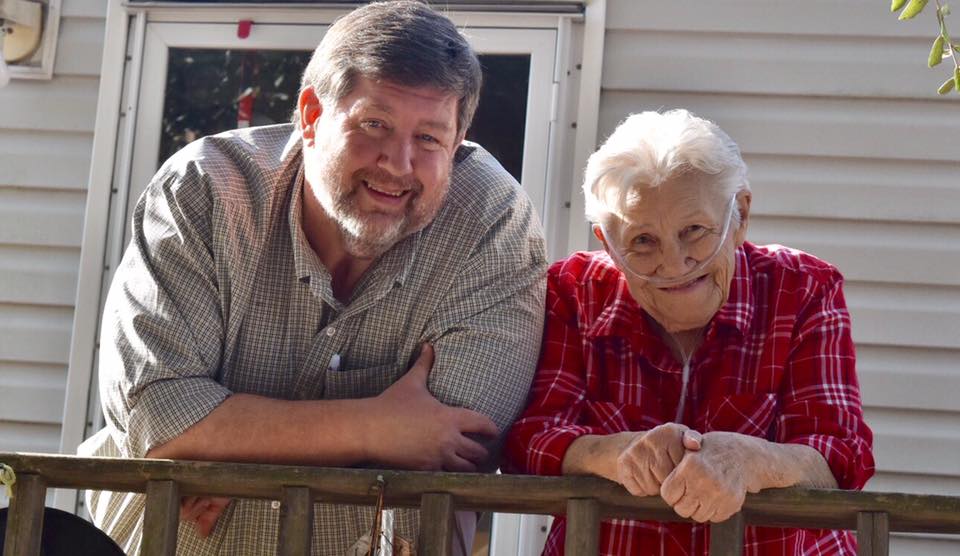
Photo: ALISON WILLIAMS
The writer and his mother.
Tommy Tomlinson writes for national publications, hosts the podcast “SouthBound,” teaches at Wake Forest University, and has written a memoir, The Elephant in the Room, to be published by Simon & Schuster. He and his wife, Alix Felsing, live in Charlotte.


